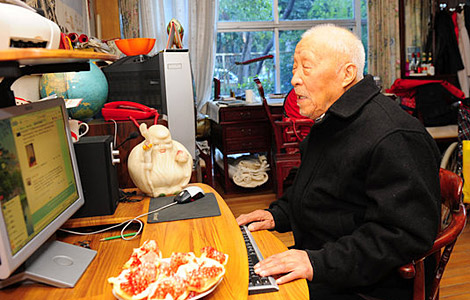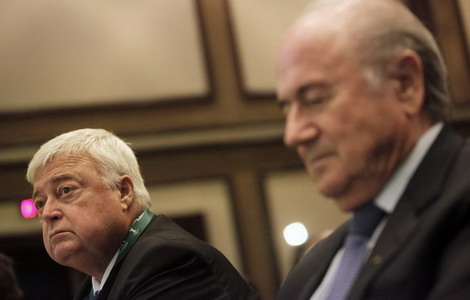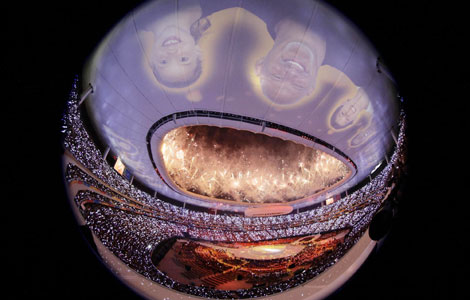|
|||||||||||
BEIJING - China may see its first annual trade deficit for two decades next year, Wei Jianguo, former vice-minister of commerce, said.
September and October are traditionally the peak time for contracts ahead of the festive season in Europe and the United States but demand is sharply down this year, he said.
"China's export-reliant enterprises are facing their toughest time in years. The possibility of a full-year trade deficit cannot be ruled out next year," Wei, secretary-general of the China Center for International Economic Exchanges, a government think tank, told China Daily.
China's last yearly deficit occurred in 1993.
Europe, China's biggest trading partner, is experiencing its worst recession since World War II, amid a continuing debt crisis and a beleaguered financial system, he said.
"Growth in emerging markets will not compensate for China's losses in Europe."
Trade between China and Europe was nearly $480 billion in 2010, or 16.1 percent of the country's total trade volume.
China's trade surplus is likely to decline to between $50 billion and $100 billion in 2011, from $183 billion in 2010, he said.
September saw the surplus narrow for a second straight month to $14.5 billion with imports and exports faltering more than expected.
Exports in September rose 17.1 percent year-on-year, down from August's 24.5 percent.
Yuan Fang, a sales manager at Kingking Applied Chemistry, a Qingdao-based candle manufacturer, said that the company's export growth declined by 10 percentage points from the pre-financial crisis era.
"The company's new strategy is to shift to the domestic market (as export demand weakens)," she said.
But Xing Yuqing, director of Asian Economic Policy at the Tokyo-based National Graduate Institute for Policy Studies, denied that China would experience a full-year deficit in 2012.
"The world economy will not be as bad as it was in 2008 and 2009," Xing said.
Li Wei, a Shanghai-based economist with Standard Chartered Bank, said that the fourth quarter of this year and the first quarter of next will shed light on the prospects for 2012.
"The global economy might see a temporary recovery in the coming two to three months due to lower oil prices or growth in the car market but it still faces great uncertainties," Li said.
Policymakers need to wait and see and further monetary tightening is unlikely, he said.
Small- and medium-sized enterprises (SMEs) in areas such as Zhejiang and Guangdong are under intense cash-flow pressure and are unable to get loans, Wei said.
Tightening policies, surging costs for labor and goods, a rising yuan and weakened export demand exert great pressure on small- and medium-sized enterprises, he said.
If these enterprises, which employ more than 70 percent of the workforce, failed, it would be "a massive blow to the economy", Wei said.
"It's time to ease macroeconomic policies in the export sector and give exporters easier access to loans," he said.
Premier Wen Jiabao recently urged more lending to small- and medium-sized enterprises and said that fiscal measures would also be taken to ease the bottleneck facing cash-thirsty small companies.
China is set to release key economic indicators on Tuesday.
According to the Center for China in the World Economy at Tsinghua University, economic growth is expected to reach 9.3 percent for the third quarter and 9.2 percent for the entire year.
Growth for the third quarter could be 9.1 percent and the full year's GDP growth might be 9.3 percent, according to Standard Chartered Bank.
As for China's $3.2 trillion foreign exchange reserve, Wei suggested that some funds, say $50 billion to $100 billion, should be used to support companies going overseas.
In addition, China can diversify its reserves by buying more natural resources and gold, he said.
Dong Tian contributed to this story.
Related Stories
Wen urges to reject trade protectionism 2011-10-14 21:01
China expects solution to trade disputes with US 2011-10-14 20:08
Experts warn of growing US trade protectionism 2011-10-05 08:03
Hot Topics
Libya conflict, Gaddafi, Oil spill, Palace Museum scandal, Inflation, Japan's new PM, Trapped miners, Mooncake tax, Weekly photos, Hurricane Irene
Editor's Picks

|

|

|

|

|

|







